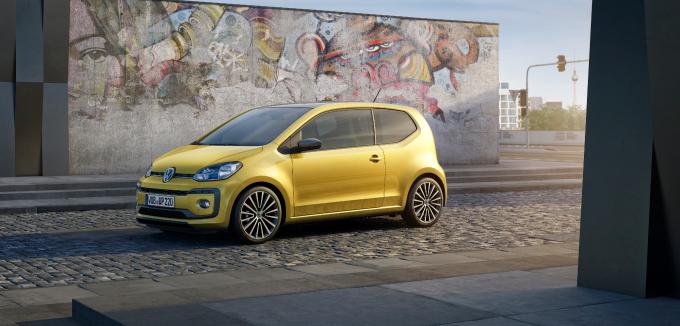VW
VW Up: The future of the micro car in the VW Group is rather uncertain
Really cheap cars and stricter CO2 requirements of the EU: This can, in the opinion of VolkswagenGroup CEO Herbert Diess did not last long. With tightened EU fleet limits, especially small cars will be significantly more expensive, he warned in mid-January at the Detroit auto show.
To the Fleet targets of the EU for the year 2030 To achieve VW would have to install expensive fuel-saving technology in his microcar. That would raise about the price of a VW Up to 3500 euros – a hefty surcharge for a vehicle whose basic version currently costs around 11,000 euros. “I’m not sure how many customers could afford our entry-level models,” Diess said bluntly.
But it is also questionable how long the Wolfsburg still want to hold on to their entry-level VW Up. For these statements allow the conclusion that he expects falling profits in the sale of micro cars – and possibly the model in question. After all, the Up is sold since the end of 2011, 2016 VW missed his smallest a facelift. So the second generation would have to be in preparation – but VW did not even hint at a successor.
Especially since important European competitors from the Minicar segment say goodbye. Opel, for example, stops selling the compact cars Adam and Karl, which were developed under GM aegis, this year. Also the new Opel owners, the French PSA Group, are clearly no longer convinced of the auto-pint segment.
PSA stated in November, a jointly operated with Toyota Kleinstwagenwerk from 2021 completely left to the Japanese. So far, the sister models Toyota Aygo, Peugeot 108 and Citroen C1 have left the production line in the Czech Republic. This step also suggests that PSA wants to say goodbye to the microcar business.
PSA complains about low profits
The sale of mini-cars in Europe certainly creates volume: According to an evaluation by Jato Dynamics, microcars reached a market share of 7.8 percent across the EU last year. They were fourth in the segment ranking behind SUVs, small cars and the compact class. Especially in southern Europe, the mini-cars are popular and sell well. Although they deliver lower margins than larger cars, but with the mass has been quite cash register.
However, this will be more difficult in the future, says PSA’s European boss Maxime Picat, according to a report by “Automotive News Europe” (ANE). Making money in this segment is going to get tougher “with all the technology we need to add,” Picat said in January. He sounded similar to Dies’s – and added an interesting sentence. “We have heard that the VW group wants to stop the development in this segment.”
Follow Wilfried Eckl-Dorna on Twitter
But not all car manufacturers agree to a swan song on their microcar. The car company Fiat Chrysler, for example, has so far heard no sound in this direction. The Italians have been leading the mini-car segment in Europe for a long time with the Fiat 500. Most recently, the Italians sold 194,000 pieces of the 500er, with their model Panda they are in second place of the small car segment.
Toyota, with its Aygo behind VW Up in fourth place in the micro-car segment, has recently increased by 9.4 percent to 87,000 vehicles sold – and remains faithful to the car. The segment is a very important part of the market for Toyota because it brings new, younger customers, Toyota’s European boss Johan van Zyl told “ANE”. With the next Aygo generation also a stronger SUV optics is possible, hinted Toyota manager.
Also from the Korean automaker Hyundai-Kia, who recently increased significantly with the Kia Picanto Europe-wide, there are currently no indications of a possible withdrawal from the segment.
Page 1 of 2

